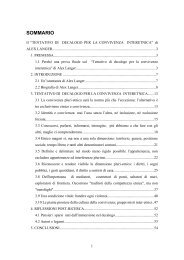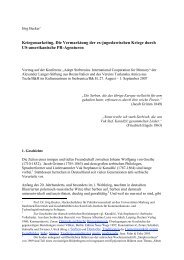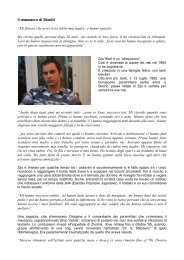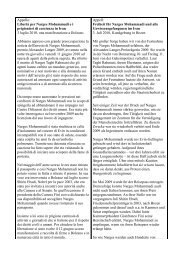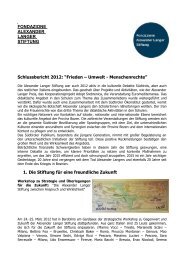HAITI ALIVE - Fondazione | Alexander Langer | Stiftung
HAITI ALIVE - Fondazione | Alexander Langer | Stiftung
HAITI ALIVE - Fondazione | Alexander Langer | Stiftung
- No tags were found...
Create successful ePaper yourself
Turn your PDF publications into a flip-book with our unique Google optimized e-Paper software.
Haiti’s ‘odious debt’ must be completely andunconditionally cancelledEric Toussaint and Sophie PerchelletHaiti was partially destroyed by an earthquake measuring 7.0 on the Richterscale. We have all shed tears and the media, as it bombards us with apocalypticimages, reports on generous financial pledges that various states have made.Haiti needs to be rebuilt. But most mainstream comments fail to look beyondthe terrible earthquake. While we are told that Haiti is one of the poorestcountries in the world, no explanations of why that is so are provided. We areled to believe that poverty just happened, that it is a situation beyond remedy,that Haiti is an ‘accursed land’.[..] It is therefore necessary to look back at the struggle for emancipation wagedby the Haitian population, because in retaliation against this revolution – whichwas both anti-slavery and anti-colonial in nature – the country inherited theransom France demanded for independence, amounting to 150 million francs(that is, France’s annual budget at the time). In 1825, France decided that ‘thecurrent inhabitants of the French part of Santo Domingo will pay into France’sFederal deposit and consignment offices, the sum of one hundred and fifty millionfrancs, to be paid in five installments, year after year, with the first termdue 31 December 1825. The money will be used to compensate the formercolonists who will demand compensation. That is equivalent to approximatelyUS$21 billion today. From the outset Haiti had to pay a very high price. Debtbecame the neocolonial instrument used to maintain access to this country’smany natural resources.The payment of this ransom is therefore the founding element of the Haitianstate. In legal terms, this means that it was contracted by a despotic regime andthis contract was used against the interests of the people. First France, thenthe United States, whose sphere of influence expanded to Haiti from 1915, areentirely responsible for this.[..] ‘Papa Doc’ Duvalier’s rule began with the help of the United States in1957; the Duvalier dictatorship lasted until 1986 when his son Baby Doc wasthrown out by a popular uprising. The violent dictatorship, broadly supportedby Western countries, ravaged the country for almost 30 years. It was markedby an exponential growth in Haiti’s debt. Between 1957 and 1986, foreign debthad multiplied 17.5 times. At the time Duvalier fled, it amounted to US$750million. It then rose, through interest and penalties, to more than US$1,884million.This debt, far from serving the interests of the impoverished population,was actually aimed at enriching the ruling regime; it is therefore in legalterms an ‘odious debt’.38



